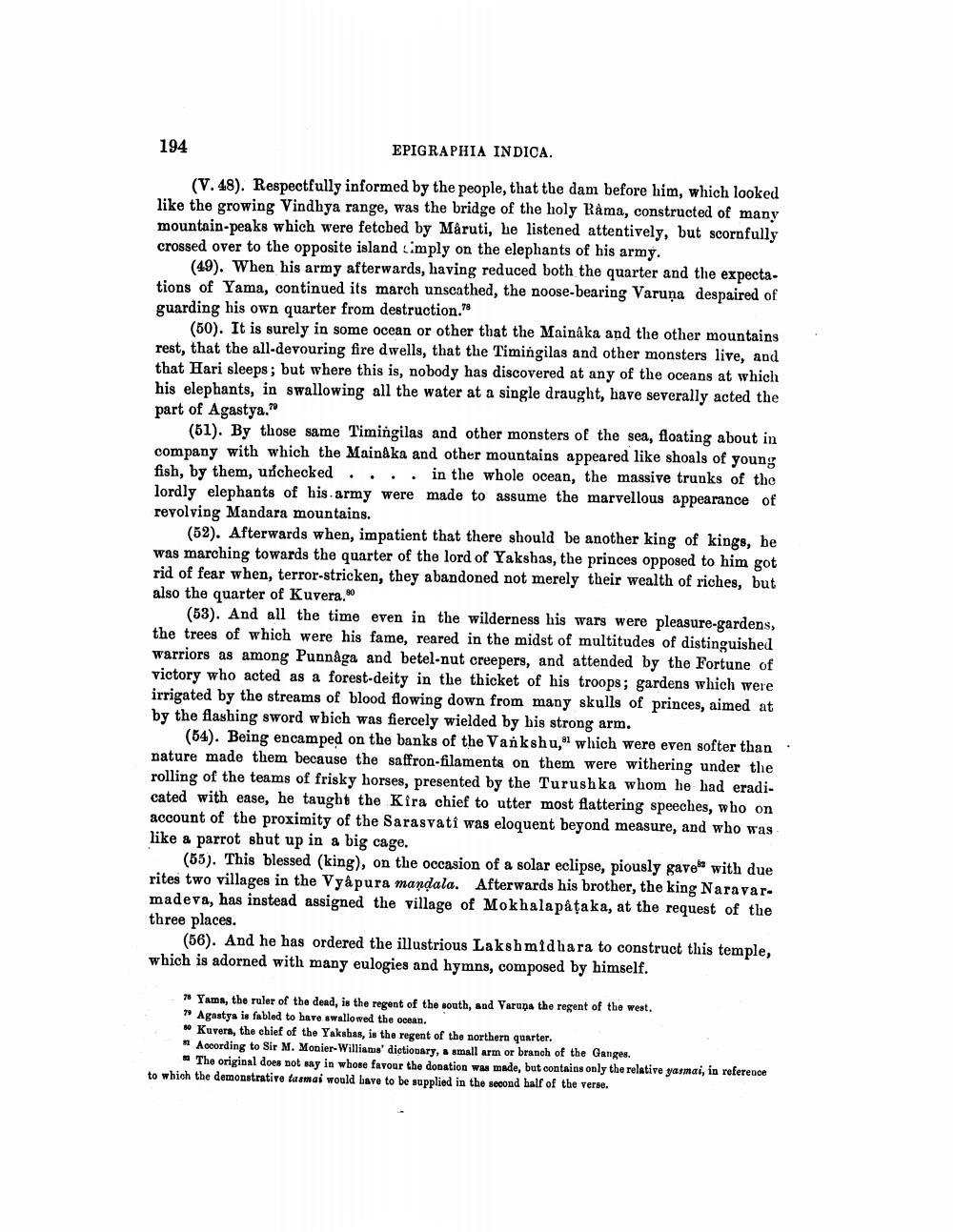________________
194
EPIGRAPHIA INDICA.
(V. 48). Respectfully informed by the people, that the dam before him, which looked like the growing Vindhya range, was the bridge of the holy Ráma, constructed of many mountain-peaks which were fetched by Maruti, le listened attentively, but scornfully crossed over to the opposite island imply on the elephants of his army.
(49). When his army afterwards, having reduced both the quarter and the expectations of Yama, continued its march unscathed, the noose-bearing Varuņa despaired of guarding his own quarter from destruction.
(50). It is surely in some ocean or other that the Maináka and the other mountains rest, that the all-devouring fire dwells, that the Timingilas and other monsters live, and that Hari sleeps; but where this is, nobody has discovered at any of the oceans at which his elephants, in swallowing all the water at a single draught, have severally acted the part of Agastya."
(51). By those same Timingilas and other monsters of the sea, floating about in company with which the Mainaka and other mountains appeared like shoals of young fish, by them, unchecked ...in the whole ocean, the massive trunks of the lordly elephants of his army were made to assume the marvellous appearance of revolving Mandara mountains.
(52). Afterwards when, impatient that there should be another king of kings, be was marching towards the quarter of the lord of Yakshas, the princes opposed to him got rid of fear when, terror-stricken, they abandoned not merely their wealth of riches, but also the quarter of Kuvera.
(53). And all the time even in the wilderness his wars were pleasure-gardens, the trees of which were his fame, reared in the midst of multitudes of distinguished warriors as among Punnaga and betel-nut creepers, and attended by the Fortune of victory who acted as a forest-deity in the thicket of his troops; gardens which were irrigated by the streams of blood flowing down from many skulls of princes, aimed at by the flashing sword which was fiercely wielded by his strong arm.
(54). Being encamped on the banks of the Vankshu," which were even softer than nature made them because the saffron-filaments on them were withering under the rolling of the teams of frisky horses, presented by the Turushka whom he had eradi. cated with ease, he taught the Kira chief to utter most flattering speeches, who on account of the proximity of the Sarasvati was eloquent beyond measure, and who was like a parrot shut up in a big cage.
(55). This blessed (king), on the occasion of a solar eclipse, piously gave with due rites two villages in the Vyapura mandala. Afterwards his brother, the king Naravar. madeva, has instead assigned the village of Mokhala pataka, at the request of the three places.
(56). And he has ordered the illustrious Lakshmidhara to construct this temple, which is adorned with many eulogies and hymns, composed by himself.
** Yams, the ruler of the dead, in the regent of the south, and Varupa the regent of the west.
Agastya is fabled to have swallowed the ocean. # Kuvera, the chief of the Yakshas, is the regent of the northern quarter.
According to Sir M. Monier-Williams' dictionary, a small arm or branch of the Ganges.
The original does not say in whose favour the donation was made, but contains only the relative gasmai, in reference to which the demonstrativo tamai would have to be supplied in the second half of the verse.




